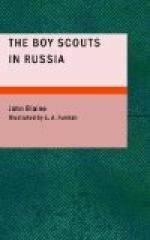Fred stared at him curiously for a moment.
“Gee! You do hate us—and me!” he said, slowly. “I think you really believe all you’ve said about me! Well, I’m glad if that’s so. It gives you a sort of excuse for behaving the way you have to me. And I’d certainly hate to think that any relative of mine could act like you unless he thought he was in the right, anyhow!”
Suvaroff strangled with anger for a moment. His cruel eyes became narrow.
“I have changed my mind!” he cried, suddenly. “Seize him! Bring him back!”
Fred stood perfectly still as two or three policemen and a couple of soldiers in the white uniform coats of Russia came toward him. He knew that it would be useless either to run or to fight. But, as it turned out, there was no need for him to do either, for from behind him a sharp order was snapped out by a young man who had been listening with interest. Quietly a file of German soldiers with spiked helmets stepped forward.
“Your pardon, excellency,” said the German officer. “It is, of course, quite impossible for us to permit Russian officials or soldiers to make an arrest on our side of the line!”
“A matter of courtesy—” began Suvaroff.
“Pardon again,” said the German, very softly. “Just at this moment courtesy must be suspended. With a general mobilization in effect upon both sides—”
Suvaroff suppressed the angry exclamation that was on his lips. For a moment, however, he seemed about to repeat his order, though his men had halted at the sight of German bayonets.
“I should regret a disturbance,” said the German, still speaking in his quiet voice. “My orders are to permit my men to do nothing that might bring on a clash, for just now the firing of a single shot would make war certain. Yet there is nothing in my orders to forbid me to resist an act of aggression by Russia. We are prepared for war, though we do not seek it.”
Fred, almost losing interest in his own pressing troubles at this sudden revelation of a state of affairs of which he had known nothing whatever, looked fixedly at Suvaroff. He saw the Russian bite his lips, hesitate, and finally take off his hat and make a sweeping bow to the German officer.
“I agree, mein herr Lieutenant,” he said, mockingly. “The time has come, I think. It may be that the fortunes of war will bring us together. Meanwhile I wish you joy of him you have saved!”
The German did not answer. He watched the departing Russians and then, smiling faintly, he turned to Fred.
“I’ll have to ask you to give some account of yourself, if you please,” he said, in excellent English. “I’m Lieutenant Ernst, of the Prussian army. Sentenced to guard duty here—for my sins. Now will you tell me what all this means?”
“I had a passport,” said Fred directly, and meeting the German’s eyes frankly. “Prince Suvaroff is my uncle, my mother’s brother. Her family refused to recognize my mother after her marriage to my father, and so Prince Suvaroff does not like me. I had to see him on business and family matters. I was arrested. My passport and my money were taken away from me—and you saw what happened. He took me off the train and put me across the border.”




